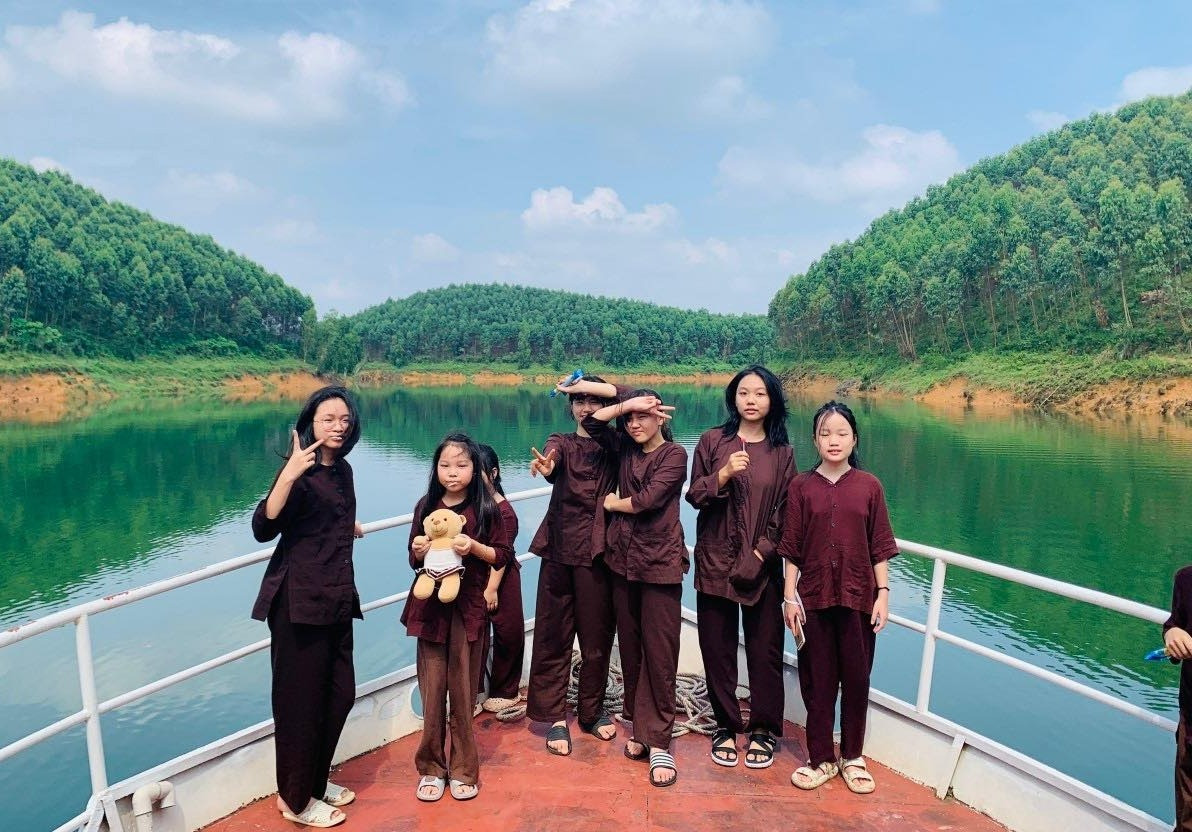
Located 157 kilometers from Hanoi and in the center of Yen Bai City is Lang Phat Giao Nguyen Thuy (Original Buddhist Village), or retreat village, where tens of monks and families of recluses live. In summer, they receive many children who choose to stay there.
Buddhist nun Thich Tam Thuan said children can learn how to live independently and love all beings.
“We don’t have any retreat course here. Summer is the time for children’s play and entertainment,” she said.
To be able to stay there and enjoy the peaceful life, children have to be accompanied by parents, who will live with their children during the time they stay in the village.
And unlike other children who are sent to retreat courses at many pagodas in the north, the children there can freely play, have meals, and carry out daily activities.
“Here they can live close to nature. They are taught a neat and clean lifestyle. They are asked not to litter, live independently according to their ages, eat vegetarian food, live a healthy life according to Buddhism, and love all living things. They are educated about filial duty, respecting grandparents and parents, loving friends, and being tolerant towards siblings,” the nun said.
The lessons about the issues won’t be transmitted like lectures, but children will learn by watching and following people around them.
The village has a peaceful landscape, close to nature with good-natured people. In the villages, monks and people spend time on their work, but they don’t take care of the children.
“We just set an example for parents and children to follow,” she said.
When staying at the village, not only children but parents also can learn Buddhist ethics. Parents can learn to love, understand and become fellow travelers with their children and learn not to impose rules on the children.
Nun Tam Thuan, who has been leading a religious life in the village for five years, said the top goal of the retreat village is living quietly and peacefully, maintaining purity in mind, avoiding making noise and chaos, and respecting laws.
Parents and children who want to live in the village for a certain period have to register their stay. The village does not accept too many people at the same time, and only receives dozens of children each summer. Most of the children are from Buddhist families. In the village, people learn from each other. One person learns from others. One family learns from other families. One child learns from another child.
In the monastery village, children can play healthy games, learn about nature, visit the Thac Ba Reservoir, play on sand dunes, have river bathing and set up camps. Parents and children are together to entertain themselves and learn morality.
Teacher Phap Luu, the founder and representative of the Yen Bai Lang Phat Giao Nguyen Thuy, said that children don’t have to listen to sermons or discuss scriptures. The monks and people in the village always value the reality of life, concrete actions, and substantial contributions.
“We don’t try to attract as many people to the village as possible. We appreciate the quality when teaching children and giving them human love, so they can grow up into useful people who respect people around them,” Luu said.
Not only children but adults also want to attend retreat courses to relax after a certain period of working and studying.
Thuy Nga, 28, from Ha Dong district in Hanoi, said the time spent on a retreat course at Tu Xuyen Temple in Thai Binh was the most wonderful time in her life. She could live a life with slow rhythms, and leave all her worries outside temple doors. This was also the time when she did not use mobile phones for four to five days and felt happy about this.
“Before I heard about the retreat course, I always had boring summers, when I mostly watched TV, accessed social networks and studied. The life at the retreat course was so different from my usual life. I had wonderful days and received so many valuable lessons,” she recalled.
The persons attending retreat courses at pagodas get up early, sit in meditation and do physical exercise. They listen to lectures about Buddhism on different topics each day, such as why people have to have sympathy for other people, and why people have to keep filial devotion.
Nguyen Thao - Ha Nguyen